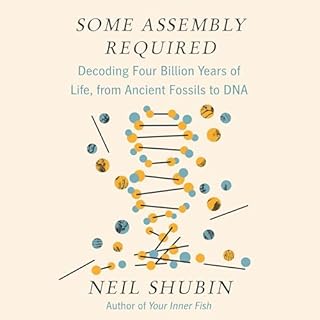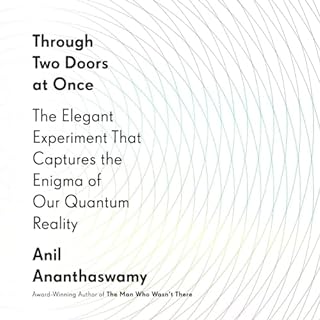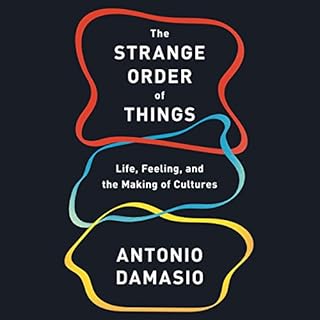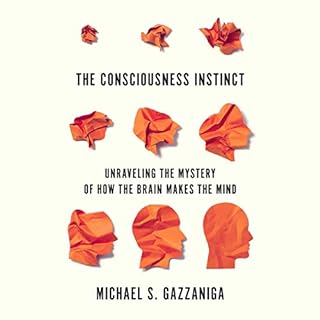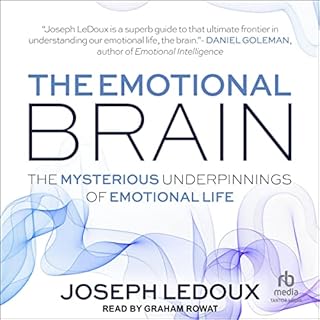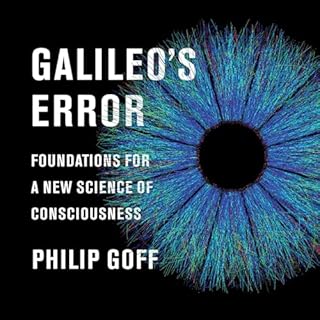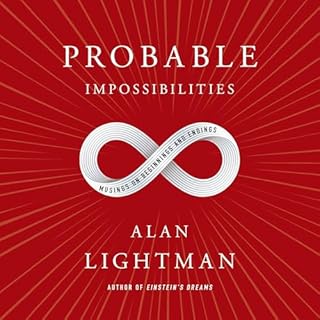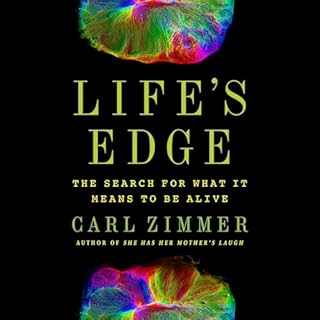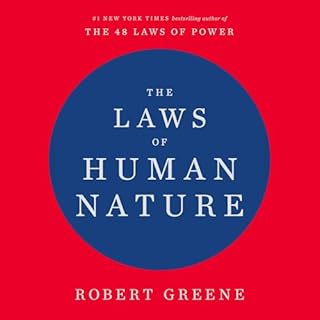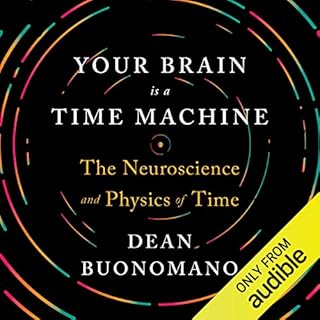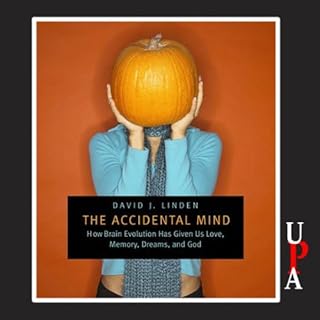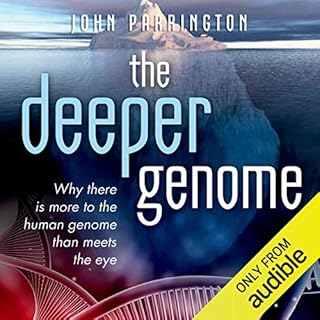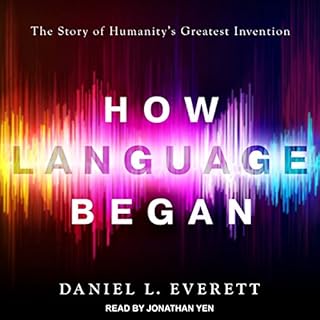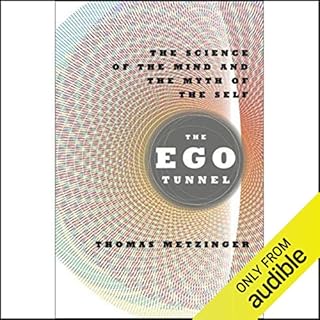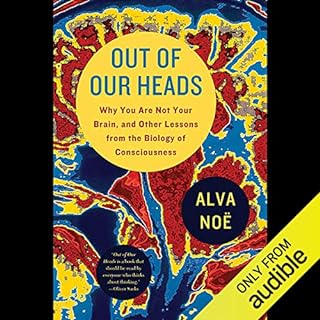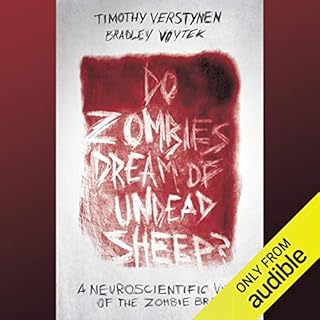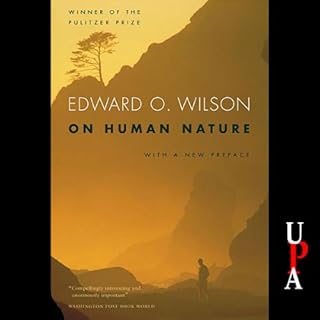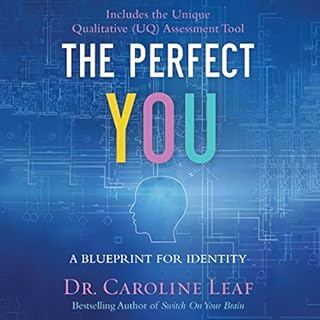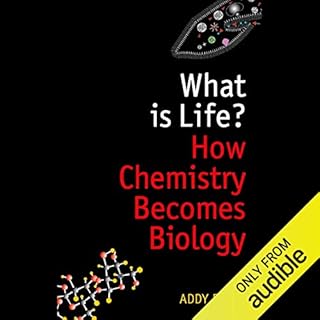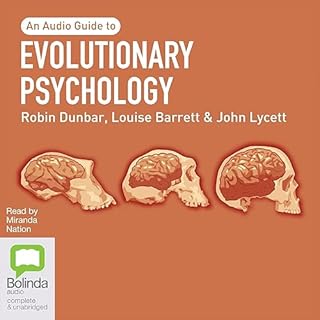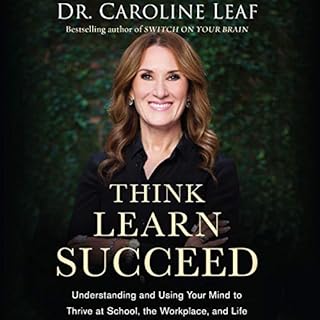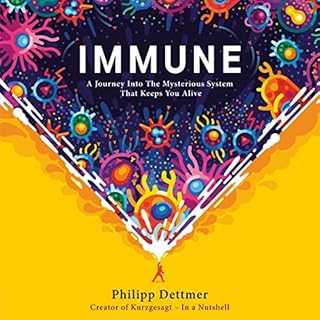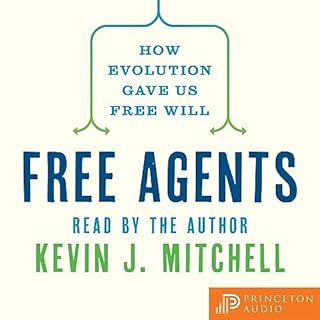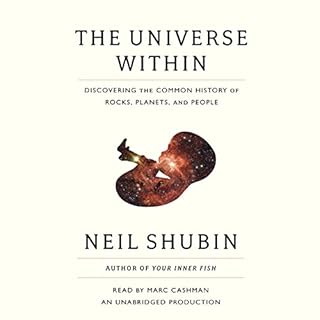
The Deep History of Ourselves
The Four-Billion-Year Story of How We Got Conscious Brains
No se pudo agregar al carrito
Add to Cart failed.
Error al Agregar a Lista de Deseos.
Error al eliminar de la lista de deseos.
Error al añadir a tu biblioteca
Error al seguir el podcast
Error al dejar de seguir el podcast
 Exclusivo para miembros Prime: ¿Nuevo en Audible? Obtén 2 audiolibros gratis con tu prueba.
Exclusivo para miembros Prime: ¿Nuevo en Audible? Obtén 2 audiolibros gratis con tu prueba.Compra ahora por $18.00
No default payment method selected.
We are sorry. We are not allowed to sell this product with the selected payment method
-
Narrado por:
-
Fred Sanders
-
De:
-
Joseph LeDoux
Acerca de esta escucha
A leading neuroscientist offers a history of the evolution of the brain from unicellular organisms to the complexity of animals and human beings today
Renowned neuroscientist Joseph LeDoux digs into the natural history of life on earth to provide a new perspective on the similarities between us and our ancestors in deep time. This pause-resisting survey of the whole of terrestrial evolution sheds new light on how nervous systems evolved in animals, how the brain developed, and what it means to be human.
In The Deep History of Ourselves, LeDoux argues that the key to understanding human behavior lies in viewing evolution through the prism of the first living organisms. By tracking the chain of the evolutionary timeline he shows how even the earliest single-cell organisms had to solve the same problems we and our cells have to solve each day. Along the way, LeDoux explores our place in nature, how the evolution of nervous systems enhanced the ability of organisms to survive and thrive, and how the emergence of what we humans understand as consciousness made our greatest and most horrendous achievements as a species possible.
*Includes a PDF of original reference illustrations from the text
PLEASE NOTE: When you purchase this title, the accompanying PDF will be available in your Audible Library along with the audio.
©2019 Joseph LeDoux (P)2019 Penguin AudioLos oyentes también disfrutaron...
-
Some Assembly Required
- Decoding Four Billion Years of Life, from Ancient Fossils to DNA
- De: Neil Shubin
- Narrado por: Marc Cashman
- Duración: 7 h y 28 m
- Versión completa
-
General4.5 out of 5 stars 310
-
Narración:4.5 out of 5 stars 258
-
Historia4.5 out of 5 stars 258
Over billions of years, ancient fish evolved to walk on land, reptiles transformed into birds that fly, and apelike primates evolved into humans that walk on two legs, talk, and write. For more than a century, paleontologists have traveled the globe to find fossils that show how such changes have happened.
-
2 out of 5 stars
-
Interesting but thin. ANNOYING narration
- De MSB en 04-10-20
De: Neil Shubin
-
The Map of Knowledge
- A Thousand-Year History of How Classical Ideas Were Lost and Found
- De: Violet Moller
- Narrado por: Susan Duerden
- Duración: 8 h y 46 m
- Versión completa
-
General4.5 out of 5 stars 106
-
Narración:4.5 out of 5 stars 87
-
Historia4.5 out of 5 stars 86
The foundations of modern knowledge - philosophy, math, astronomy, geography - were laid by the Greeks, whose ideas were written on scrolls and stored in libraries across the Mediterranean and beyond. But as the vast Roman Empire disintegrated, so did appreciation of these precious texts. Christianity cast a shadow over so-called pagan thought, books were burned, and the library of Alexandria, the greatest repository of classical knowledge, was destroyed. Yet some texts did survive and The Map of Knowledge explores the role played by seven cities around the Mediterranean....
-
3 out of 5 stars
-
Terrible narration.
- De nathan535 en 11-05-19
De: Violet Moller
-
Through Two Doors at Once
- The Elegant Experiment That Captures the Enigma of Our Quantum Reality
- De: Anil Ananthaswamy
- Narrado por: René Ruiz
- Duración: 7 h y 36 m
- Versión completa
-
General4.5 out of 5 stars 243
-
Narración:4.5 out of 5 stars 205
-
Historia4.5 out of 5 stars 203
The intellectual adventure story of the "double-slit" experiment, showing how a sunbeam split into two paths first challenged our understanding of light and then the nature of reality itself - and continues to almost 200 years later. Through Two Doors at Once celebrates the elegant simplicity of an iconic experiment and its profound reach. With his extraordinarily gifted eloquence, Anil Ananthaswamy travels around the world, through history and down to the smallest scales of physical reality we have yet fathomed. It is the most fantastic voyage you can take.
-
5 out of 5 stars
-
Excellent exposition of the conundrum
- De GLYNN A en 08-14-18
-
The Strange Order of Things
- Life, Feeling, and the Making of Cultures
- De: Antonio Damasio
- Narrado por: Steve West, Antonio Damasio
- Duración: 9 h
- Versión completa
-
General4 out of 5 stars 335
-
Narración:4.5 out of 5 stars 286
-
Historia4 out of 5 stars 279
The Strange Order of Things is a pathbreaking investigation into homeostasis, the condition that regulates human physiology within the range that makes possible not only the survival but also the flourishing of life. Antonio Damasio makes clear that we descend biologically, psychologically, and even socially from a long lineage that begins with single living cells; that our minds and cultures are linked by an invisible thread to the ways and means of ancient unicellular life and other primitive life-forms.
-
5 out of 5 stars
-
Homeostasis and Metabolism give self awareness
- De Gary en 03-22-18
De: Antonio Damasio
-
The Consciousness Instinct
- Unraveling the Mystery of How the Brain Makes the Mind
- De: Michael S. Gazzaniga
- Narrado por: David Colacci
- Duración: 9 h y 34 m
- Versión completa
-
General4.5 out of 5 stars 220
-
Narración:4.5 out of 5 stars 195
-
Historia4.5 out of 5 stars 195
How do neurons turn into minds? The problem of consciousness has gnawed at us for millennia. In the last century there have been massive breakthroughs that have rewritten the science of the brain, and yet the puzzles faced by the ancient Greeks are still present. In The Consciousness Instinct, the neuroscience pioneer Michael S. Gazzaniga puts the latest research in conversation with the history of human thinking about the mind, giving a big-picture view of what science has revealed about consciousness.
-
1 out of 5 stars
-
Not recommended
- De PMonaco en 01-19-19
-
Anxious
- Using the Brain to Understand and Treat Fear and Anxiety
- De: Joseph LeDoux
- Narrado por: Jonathan Davis
- Duración: 13 h y 21 m
- Versión completa
-
General4 out of 5 stars 103
-
Narración:4.5 out of 5 stars 80
-
Historia4 out of 5 stars 81
Collectively, anxiety disorders are our most prevalent psychiatric problem, affecting about 40 million adults in the United States. In Anxious, Joseph LeDoux, whose NYU lab has been at the forefront of research efforts to understand and treat fear and anxiety, explains the range of these disorders, their origins, and discoveries that can restore sufferers to normalcy. LeDoux's groundbreaking premise is that we've been thinking about fear and anxiety in the wrong way.
-
1 out of 5 stars
-
Not practical and quite boring
- De fathead panda en 03-16-18
De: Joseph LeDoux
-
Some Assembly Required
- Decoding Four Billion Years of Life, from Ancient Fossils to DNA
- De: Neil Shubin
- Narrado por: Marc Cashman
- Duración: 7 h y 28 m
- Versión completa
-
General4.5 out of 5 stars 310
-
Narración:4.5 out of 5 stars 258
-
Historia4.5 out of 5 stars 258
Over billions of years, ancient fish evolved to walk on land, reptiles transformed into birds that fly, and apelike primates evolved into humans that walk on two legs, talk, and write. For more than a century, paleontologists have traveled the globe to find fossils that show how such changes have happened.
-
2 out of 5 stars
-
Interesting but thin. ANNOYING narration
- De MSB en 04-10-20
De: Neil Shubin
-
The Map of Knowledge
- A Thousand-Year History of How Classical Ideas Were Lost and Found
- De: Violet Moller
- Narrado por: Susan Duerden
- Duración: 8 h y 46 m
- Versión completa
-
General4.5 out of 5 stars 106
-
Narración:4.5 out of 5 stars 87
-
Historia4.5 out of 5 stars 86
The foundations of modern knowledge - philosophy, math, astronomy, geography - were laid by the Greeks, whose ideas were written on scrolls and stored in libraries across the Mediterranean and beyond. But as the vast Roman Empire disintegrated, so did appreciation of these precious texts. Christianity cast a shadow over so-called pagan thought, books were burned, and the library of Alexandria, the greatest repository of classical knowledge, was destroyed. Yet some texts did survive and The Map of Knowledge explores the role played by seven cities around the Mediterranean....
-
3 out of 5 stars
-
Terrible narration.
- De nathan535 en 11-05-19
De: Violet Moller
-
Through Two Doors at Once
- The Elegant Experiment That Captures the Enigma of Our Quantum Reality
- De: Anil Ananthaswamy
- Narrado por: René Ruiz
- Duración: 7 h y 36 m
- Versión completa
-
General4.5 out of 5 stars 243
-
Narración:4.5 out of 5 stars 205
-
Historia4.5 out of 5 stars 203
The intellectual adventure story of the "double-slit" experiment, showing how a sunbeam split into two paths first challenged our understanding of light and then the nature of reality itself - and continues to almost 200 years later. Through Two Doors at Once celebrates the elegant simplicity of an iconic experiment and its profound reach. With his extraordinarily gifted eloquence, Anil Ananthaswamy travels around the world, through history and down to the smallest scales of physical reality we have yet fathomed. It is the most fantastic voyage you can take.
-
5 out of 5 stars
-
Excellent exposition of the conundrum
- De GLYNN A en 08-14-18
-
The Strange Order of Things
- Life, Feeling, and the Making of Cultures
- De: Antonio Damasio
- Narrado por: Steve West, Antonio Damasio
- Duración: 9 h
- Versión completa
-
General4 out of 5 stars 335
-
Narración:4.5 out of 5 stars 286
-
Historia4 out of 5 stars 279
The Strange Order of Things is a pathbreaking investigation into homeostasis, the condition that regulates human physiology within the range that makes possible not only the survival but also the flourishing of life. Antonio Damasio makes clear that we descend biologically, psychologically, and even socially from a long lineage that begins with single living cells; that our minds and cultures are linked by an invisible thread to the ways and means of ancient unicellular life and other primitive life-forms.
-
5 out of 5 stars
-
Homeostasis and Metabolism give self awareness
- De Gary en 03-22-18
De: Antonio Damasio
-
The Consciousness Instinct
- Unraveling the Mystery of How the Brain Makes the Mind
- De: Michael S. Gazzaniga
- Narrado por: David Colacci
- Duración: 9 h y 34 m
- Versión completa
-
General4.5 out of 5 stars 220
-
Narración:4.5 out of 5 stars 195
-
Historia4.5 out of 5 stars 195
How do neurons turn into minds? The problem of consciousness has gnawed at us for millennia. In the last century there have been massive breakthroughs that have rewritten the science of the brain, and yet the puzzles faced by the ancient Greeks are still present. In The Consciousness Instinct, the neuroscience pioneer Michael S. Gazzaniga puts the latest research in conversation with the history of human thinking about the mind, giving a big-picture view of what science has revealed about consciousness.
-
1 out of 5 stars
-
Not recommended
- De PMonaco en 01-19-19
-
Anxious
- Using the Brain to Understand and Treat Fear and Anxiety
- De: Joseph LeDoux
- Narrado por: Jonathan Davis
- Duración: 13 h y 21 m
- Versión completa
-
General4 out of 5 stars 103
-
Narración:4.5 out of 5 stars 80
-
Historia4 out of 5 stars 81
Collectively, anxiety disorders are our most prevalent psychiatric problem, affecting about 40 million adults in the United States. In Anxious, Joseph LeDoux, whose NYU lab has been at the forefront of research efforts to understand and treat fear and anxiety, explains the range of these disorders, their origins, and discoveries that can restore sufferers to normalcy. LeDoux's groundbreaking premise is that we've been thinking about fear and anxiety in the wrong way.
-
1 out of 5 stars
-
Not practical and quite boring
- De fathead panda en 03-16-18
De: Joseph LeDoux
-
The Emotional Brain
- The Mysterious Underpinnings of Emotional Life
- De: Joseph Ledoux
- Narrado por: Graham Rowat
- Duración: 10 h y 46 m
- Versión completa
-
General5 out of 5 stars 6
-
Narración:5 out of 5 stars 4
-
Historia4.5 out of 5 stars 4
What happens in our brains to make us feel fear, love, hate, anger, joy? Do we control our emotions, or do they control us? Do animals have emotions? How can traumatic experiences in early childhood influence adult behavior, even though we have no conscious memory of them? In The Emotional Brain, Joseph LeDoux investigates the origins of human emotions and explains that many exist as part of complex neural systems that evolved to enable us to survive.
De: Joseph Ledoux
-
Galileo's Error
- Foundations for a New Science of Consciousness
- De: Philip Goff
- Narrado por: Maxwell Caulfield
- Duración: 8 h y 3 m
- Versión completa
-
General4.5 out of 5 stars 212
-
Narración:4.5 out of 5 stars 179
-
Historia4.5 out of 5 stars 176
Understanding how brains produce consciousness is one of the great scientific challenges of our age. Some philosophers argue that consciousness is something "extra", beyond the physical workings of the brain. Others think that if we persist in our standard scientific methods, our questions about consciousness will eventually be answered. And some suggest that the mystery is so deep, it will never be solved.
-
3 out of 5 stars
-
Good but basic
- De ginger en 01-23-20
De: Philip Goff
-
Metazoa
- Animal Life and the Birth of the Mind
- De: Peter Godfrey-Smith
- Narrado por: Mitch Riley, Peter Godfrey-Smith
- Duración: 9 h y 49 m
- Versión completa
-
General4.5 out of 5 stars 317
-
Narración:4.5 out of 5 stars 256
-
Historia4.5 out of 5 stars 253
Dip below the ocean’s surface and you are soon confronted by forms of life that could not seem more foreign to our own: sea sponges, soft corals, and serpulid worms, whose rooted bodies, intricate geometry, and flower-like appendages are more reminiscent of plant life or even architecture than anything recognizably animal. Yet these creatures are our cousins. As fellow members of the animal kingdom — the Metazoa— they can teach us much about the evolutionary origins of not only our bodies, but also our minds.
-
5 out of 5 stars
-
Philosophy Meets Biology
- De aaron en 01-22-21
-
Ingredients
- The Strange Chemistry of What We Put in Us and on Us
- De: George Zaidan
- Narrado por: George Zaidan
- Duración: 6 h y 55 m
- Versión completa
-
General4.5 out of 5 stars 286
-
Narración:4.5 out of 5 stars 246
-
Historia4.5 out of 5 stars 244
Cheese puffs. Coffee. Sunscreen. Vapes. George Zaidan reveals what will kill you, what won’t, and why - explained with high-octane hilarity, hysterical hijinks, and other things that don’t begin with the letter H. Ingredients offers the perspective of a chemist on the stuff we eat, drink, inhale, and smear on ourselves. Apart from the burning question of whether you should eat that Cheeto, Zaidan explores a range of topics.
-
3 out of 5 stars
-
Disappointed in the nutrition conclusion
- De Cristi en 01-30-22
De: George Zaidan
-
Probable Impossibilities
- Musings on Beginnings and Endings
- De: Alan Lightman
- Narrado por: Christopher Grove
- Duración: 5 h y 45 m
- Versión completa
-
General4.5 out of 5 stars 160
-
Narración:4.5 out of 5 stars 144
-
Historia4.5 out of 5 stars 143
Can space be divided into smaller and smaller units, ad infinitum? Does space extend to larger and larger regions, on and on to infinity? Is consciousness reducible to the material brain and its neurons? What was the origin of life, and can biologists create life from scratch in the lab? Physicist and novelist Alan Lightman explores these questions and more - from the anatomy of a smile to the capriciousness of memory to the specialness of life in the universe to what came before the Big Bang.
-
3 out of 5 stars
-
Mumbler
- De Phil Gaskill en 08-07-22
De: Alan Lightman
-
Life's Edge
- The Search for What It Means to Be Alive
- De: Carl Zimmer
- Narrado por: Joe Ochman
- Duración: 9 h y 15 m
- Versión completa
-
General4.5 out of 5 stars 359
-
Narración:4.5 out of 5 stars 293
-
Historia4.5 out of 5 stars 290
Carl Zimmer investigates one of the biggest questions of all: What is life? The answer seems obvious until you try to seriously answer it. Is the apple sitting on your kitchen counter alive, or is only the apple tree it came from deserving of the word? If we can’t answer that question here on Earth, how will we know when and if we discover alien life on other worlds? The question hangs over some of society’s most charged conflicts - whether a fertilized egg is a living person, for example, and when we ought to declare a person legally dead.
-
5 out of 5 stars
-
What is Life?
- De Shane S Shull en 04-29-21
De: Carl Zimmer
-
Self Comes to Mind
- Constructing the Conscious Brain
- De: Antonio Damasio
- Narrado por: Fred Stella
- Duración: 11 h y 28 m
- Versión completa
-
General4 out of 5 stars 227
-
Narración:4 out of 5 stars 158
-
Historia4 out of 5 stars 155
Self Comes to Mind is a nuanced and original chronicle of the evolution of the human brain. It reveals how the brain's development of a self becomes a challenge to nature's indifference and opens the way for the appearance of culture, a radical break in the course of evolution.
-
2 out of 5 stars
-
Audio nightmare
- De Jess en 12-15-10
De: Antonio Damasio
-
A History of the Human Brain
- From the Sea Sponge to CRISPR, How Our Brain Evolved
- De: Bret Stetka
- Narrado por: Sean Pratt
- Duración: 7 h y 54 m
- Versión completa
-
General4.5 out of 5 stars 125
-
Narración:4.5 out of 5 stars 92
-
Historia4.5 out of 5 stars 92
Just over 125,000 years ago, humanity was going extinct until a dramatic shift occurred—Homo sapiens started tracking the tides in order to eat the nearby oysters. Before long, they’d pulled themselves back from the brink of extinction. The human brain, and its evolutionary journey, is unlike anything else in history. In A History of the Human Brain, Bret Stetka takes listeners through that far-reaching journey. He also tackles the question of where the brain will take us next, exploring the burgeoning concepts of epigenetics and new technologies like CRISPR.
-
5 out of 5 stars
-
Fascinating survey of the evolution of the human brain
- De Cosmos en 03-30-21
De: Bret Stetka
-
Einstein's Unfinished Revolution
- The Search for What Lies Beyond the Quantum
- De: Lee Smolin
- Narrado por: Katharine Lee McEwan
- Duración: 10 h y 18 m
- Versión completa
-
General4.5 out of 5 stars 340
-
Narración:4.5 out of 5 stars 296
-
Historia4.5 out of 5 stars 297
A daring new vision of quantum theory from one of the leading minds of contemporary physics. In Einstein's Unfinished Revolution, theoretical physicist Lee Smolin provocatively argues that the problems that have bedeviled quantum physics since its inception are unsolved and unsolvable, for the simple reason that the theory is incomplete.
-
5 out of 5 stars
-
Awesome Smolin
- De Michael en 05-14-19
De: Lee Smolin
-
The Laws of Human Nature
- De: Robert Greene
- Narrado por: Paul Michael, Robert Greene
- Duración: 28 h y 26 m
- Versión completa
-
General5 out of 5 stars 14,470
-
Narración:5 out of 5 stars 12,268
-
Historia5 out of 5 stars 12,196
Robert Greene is a master guide for millions of listeners, distilling ancient wisdom and philosophy into essential texts for seekers of power, understanding, and mastery. Now he turns to the most important subject of all - understanding people's drives and motivations, even when they are unconscious of them themselves. Whether at work, in relationships, or in shaping the world around you, The Laws of Human Nature offers brilliant tactics for success, self-improvement, and self-defense.
-
5 out of 5 stars
-
Tempo is key! (1.25X)
- De James Hawkins en 11-12-18
De: Robert Greene
-
The Human Cosmos
- Civilization and the Stars
- De: Jo Marchant
- Narrado por: Jo Marchant
- Duración: 11 h y 25 m
- Versión completa
-
General4.5 out of 5 stars 207
-
Narración:5 out of 5 stars 176
-
Historia4.5 out of 5 stars 175
For at least 20,000 years, we have led not just an earthly existence, but a cosmic one. Celestial cycles drove every aspect of our daily lives. Our innate relationship with the stars shaped who we are - our art, religious beliefs, social status, scientific advances, and even our biology. But over the last few centuries we have separated ourselves from the universe that surrounds us. It's a disconnect with a dire cost.
-
5 out of 5 stars
-
This book has changed the way I think about my own mortality!
- De Jerry en 02-04-21
De: Jo Marchant
-
Your Brain Is a Time Machine
- The Neuroscience and Physics of Time
- De: Dean Buonomano
- Narrado por: Aaron Abano
- Duración: 8 h y 51 m
- Versión completa
-
General4.5 out of 5 stars 571
-
Narración:4.5 out of 5 stars 466
-
Historia4.5 out of 5 stars 466
In Your Brain Is a Time Machine, brain researcher and best-selling author Dean Buonomano draws on evolutionary biology, physics, and philosophy to present his influential theory of how we tell and perceive time. The human brain, he argues, is a complex system that not only tells time but creates it; it constructs our sense of chronological flow and enables "mental time travel" - simulations of future and past events.
-
5 out of 5 stars
-
Great book on an underrated subject
- De Neuron en 05-09-17
De: Dean Buonomano
Reseñas de la Crítica
"Readers have good reason to ponder LeDoux’s concluding challenge. [A] refreshingly lucid treatment of profound questions.” (Booklist, starred review)
“Plenty of popular authors describe the history of life, but LeDoux wants readers to remember as well as enjoy, so he divides his book into short, pithy chapters, each explaining a single evolutionary advance.... Like all good educators, the author begins simply.... [An] expert history of human behavior beginning at the beginning.” (Kirkus Reviews)
"Joseph LeDoux is the major scientist leading the current important effort to delineate the brain mechanisms of emotional states. In his most recent book, The Deep History of Ourselves, LeDoux attempts to connect the survival capacity of single-celled micro-organisms to the unique human capacity for survival. This capacity is importantly mediated by our ability to think, feel, and to contemplate not only our own past and future but the past and future of humankind. This is an extraordinary book. Indeed, as LeDoux points out, it is a deep history of ourselves." (Eric R. Kandel, Kavli Professor and University Professor, Columbia University; Senior Investigator, Howard Hughes Medical Institute; author of In Search of Memory and The Age of Insight; recipient of the 2000 Nobel Prize in Physiology or Medicine)
Relacionado con este tema
-
The Accidental Mind
- How Brain Evolution Has Given Us Love, Memory, Dreams, and God
- De: David J. Linden
- Narrado por: Ray Porter
- Duración: 7 h y 56 m
- Versión completa
-
General4 out of 5 stars 321
-
Narración:4 out of 5 stars 211
-
Historia4 out of 5 stars 210
You've probably seen it before: a human brain dramatically lit from the side, the camera circling it like a helicopter shot of Stonehenge, and a modulated baritone voice exalting the brain's elegant design in reverent tones... to which this book says: Pure nonsense.
-
5 out of 5 stars
-
Best general-public Brain Science book to date
- De Francisco en 02-14-11
De: David J. Linden
-
The Deeper Genome
- Why There Is More to the Human Genome than Meets the Eye
- De: John Parrington
- Narrado por: John Lee
- Duración: 9 h
- Versión completa
-
General4 out of 5 stars 106
-
Narración:4 out of 5 stars 91
-
Historia4 out of 5 stars 92
Over a decade ago, as the Human Genome Project completed its mapping of the entire human genome, hopes ran high that we would rapidly be able to use our knowledge of human genes to tackle many inherited diseases, and understand what makes us unique among animals. But things didn't turn out that way.
-
3 out of 5 stars
-
Great Scientific Writing/ Wrong Narrator
- De Richard en 11-24-15
De: John Parrington
-
How Language Began
- The Story of Humanity's Greatest Invention
- De: Daniel L. Everett
- Narrado por: Jonathan Yen
- Duración: 13 h y 10 m
- Versión completa
-
General3.5 out of 5 stars 309
-
Narración:4 out of 5 stars 260
-
Historia4 out of 5 stars 260
Mankind has a distinct advantage over other terrestrial species: we talk to one another. But how did we acquire the most advanced form of communication on Earth? Daniel L. Everett, a "bombshell" linguist and "instant folk hero" (Tom Wolfe, Harper's), provides in this sweeping history a comprehensive examination of the evolutionary story of language, from the earliest speaking attempts by hominids to the more than 7,000 languages that exist today.
-
3 out of 5 stars
-
Hard to endure
- De Michael D. Busch en 09-09-18
-
Consciousness and the Social Brain
- De: Michael S. A. Graziano
- Narrado por: Sean Runnette
- Duración: 7 h y 39 m
- Versión completa
-
General4 out of 5 stars 231
-
Narración:4 out of 5 stars 190
-
Historia4 out of 5 stars 190
What is consciousness and how can a brain, a mere collection of neurons, create it? In Consciousness and the Social Brain, Princeton neuroscientist Michael Graziano lays out an audacious new theory to account for the deepest mystery of them all. In Graziano's theory, the machinery that attributes awareness to others also attributes it to oneself. Damage that machinery and you disrupt your own awareness. Graziano discusses the science, the evidence, the philosophy, and the surprising implications of this new theory.
-
5 out of 5 stars
-
Cutting edge...
- De Douglas en 08-07-14
-
The Ego Tunnel
- The Science of the Mind and the Myth of the Self
- De: Thomas Metzinger
- Narrado por: Kevin Pariseau
- Duración: 10 h y 24 m
- Versión completa
-
General4.5 out of 5 stars 373
-
Narración:4.5 out of 5 stars 272
-
Historia4.5 out of 5 stars 275
We're used to thinking about the self as an independent entity, something that we either have or are. In The Ego Tunnel, philosopher Thomas Metzinger claims otherwise: No such thing as a self exists. The conscious self is the content of a model created by our brain - an internal image, but one we cannot experience as an image. Everything we experience is "a virtual self in a virtual reality." But if the self is not "real," why and how did it evolve? How does the brain construct it?
-
5 out of 5 stars
-
non-specialist literature at its best
- De Esmeralda en 03-17-10
De: Thomas Metzinger
-
Out of Our Heads
- You Are Not Your Brain, and Other Lessons from the Biology of Consciousness
- De: Alva Noe
- Narrado por: Jay Snyder
- Duración: 6 h y 54 m
- Versión completa
-
General4 out of 5 stars 100
-
Narración:4 out of 5 stars 51
-
Historia4.5 out of 5 stars 51
Alva Noë is one of a new breed - part philosopher, part cognitive scientist, part neuroscientist - who are radically altering the study of consciousness by asking difficult questions and pointing out obvious flaws in the current science. In Out of Our Heads, he restates and reexamines the problem of consciousness, and then proposes a startling solution: Do away with the 200-year-old paradigm that places consciousness within the confines of the brain.
-
4 out of 5 stars
-
A bold, yet ultimately unsupported, hypothesis
- De Keith Pyne-Howarth en 01-17-10
De: Alva Noe
-
The Accidental Mind
- How Brain Evolution Has Given Us Love, Memory, Dreams, and God
- De: David J. Linden
- Narrado por: Ray Porter
- Duración: 7 h y 56 m
- Versión completa
-
General4 out of 5 stars 321
-
Narración:4 out of 5 stars 211
-
Historia4 out of 5 stars 210
You've probably seen it before: a human brain dramatically lit from the side, the camera circling it like a helicopter shot of Stonehenge, and a modulated baritone voice exalting the brain's elegant design in reverent tones... to which this book says: Pure nonsense.
-
5 out of 5 stars
-
Best general-public Brain Science book to date
- De Francisco en 02-14-11
De: David J. Linden
-
The Deeper Genome
- Why There Is More to the Human Genome than Meets the Eye
- De: John Parrington
- Narrado por: John Lee
- Duración: 9 h
- Versión completa
-
General4 out of 5 stars 106
-
Narración:4 out of 5 stars 91
-
Historia4 out of 5 stars 92
Over a decade ago, as the Human Genome Project completed its mapping of the entire human genome, hopes ran high that we would rapidly be able to use our knowledge of human genes to tackle many inherited diseases, and understand what makes us unique among animals. But things didn't turn out that way.
-
3 out of 5 stars
-
Great Scientific Writing/ Wrong Narrator
- De Richard en 11-24-15
De: John Parrington
-
How Language Began
- The Story of Humanity's Greatest Invention
- De: Daniel L. Everett
- Narrado por: Jonathan Yen
- Duración: 13 h y 10 m
- Versión completa
-
General3.5 out of 5 stars 309
-
Narración:4 out of 5 stars 260
-
Historia4 out of 5 stars 260
Mankind has a distinct advantage over other terrestrial species: we talk to one another. But how did we acquire the most advanced form of communication on Earth? Daniel L. Everett, a "bombshell" linguist and "instant folk hero" (Tom Wolfe, Harper's), provides in this sweeping history a comprehensive examination of the evolutionary story of language, from the earliest speaking attempts by hominids to the more than 7,000 languages that exist today.
-
3 out of 5 stars
-
Hard to endure
- De Michael D. Busch en 09-09-18
-
Consciousness and the Social Brain
- De: Michael S. A. Graziano
- Narrado por: Sean Runnette
- Duración: 7 h y 39 m
- Versión completa
-
General4 out of 5 stars 231
-
Narración:4 out of 5 stars 190
-
Historia4 out of 5 stars 190
What is consciousness and how can a brain, a mere collection of neurons, create it? In Consciousness and the Social Brain, Princeton neuroscientist Michael Graziano lays out an audacious new theory to account for the deepest mystery of them all. In Graziano's theory, the machinery that attributes awareness to others also attributes it to oneself. Damage that machinery and you disrupt your own awareness. Graziano discusses the science, the evidence, the philosophy, and the surprising implications of this new theory.
-
5 out of 5 stars
-
Cutting edge...
- De Douglas en 08-07-14
-
The Ego Tunnel
- The Science of the Mind and the Myth of the Self
- De: Thomas Metzinger
- Narrado por: Kevin Pariseau
- Duración: 10 h y 24 m
- Versión completa
-
General4.5 out of 5 stars 373
-
Narración:4.5 out of 5 stars 272
-
Historia4.5 out of 5 stars 275
We're used to thinking about the self as an independent entity, something that we either have or are. In The Ego Tunnel, philosopher Thomas Metzinger claims otherwise: No such thing as a self exists. The conscious self is the content of a model created by our brain - an internal image, but one we cannot experience as an image. Everything we experience is "a virtual self in a virtual reality." But if the self is not "real," why and how did it evolve? How does the brain construct it?
-
5 out of 5 stars
-
non-specialist literature at its best
- De Esmeralda en 03-17-10
De: Thomas Metzinger
-
Out of Our Heads
- You Are Not Your Brain, and Other Lessons from the Biology of Consciousness
- De: Alva Noe
- Narrado por: Jay Snyder
- Duración: 6 h y 54 m
- Versión completa
-
General4 out of 5 stars 100
-
Narración:4 out of 5 stars 51
-
Historia4.5 out of 5 stars 51
Alva Noë is one of a new breed - part philosopher, part cognitive scientist, part neuroscientist - who are radically altering the study of consciousness by asking difficult questions and pointing out obvious flaws in the current science. In Out of Our Heads, he restates and reexamines the problem of consciousness, and then proposes a startling solution: Do away with the 200-year-old paradigm that places consciousness within the confines of the brain.
-
4 out of 5 stars
-
A bold, yet ultimately unsupported, hypothesis
- De Keith Pyne-Howarth en 01-17-10
De: Alva Noe
-
Seven and a Half Lessons About the Brain
- De: Lisa Feldman Barrett
- Narrado por: Lisa Feldman Barrett
- Duración: 3 h y 53 m
- Versión completa
-
General4.5 out of 5 stars 752
-
Narración:4.5 out of 5 stars 623
-
Historia4.5 out of 5 stars 613
Have you ever wondered why you have a brain? Let renowned neuroscientist Lisa Feldman Barrett demystify that big gray blob between your ears. In seven short essays (plus a bite-sized story about how brains evolved), this slim, entertaining, and accessible collection reveals mind-expanding lessons from the front lines of neuroscience research. You'll learn where brains came from, how they're structured (and why it matters), and how yours works in tandem with other brains to create everything you experience.
-
3 out of 5 stars
-
slow reader & little bit of a Wokie
- De darren en 06-01-21
-
Wild Justice
- The Moral Lives of Animals
- De: Marc Bekoff, Jessica Pierce
- Narrado por: Simon Vance
- Duración: 6 h y 1 m
- Versión completa
-
General4 out of 5 stars 83
-
Narración:4 out of 5 stars 60
-
Historia4 out of 5 stars 59
Scientists have long counseled against interpreting animal behavior in terms of human emotions, warning that such anthropomorphizing limits our ability to understand animals as they really are. Yet what are we to make of a female gorilla in a German zoo who spent days mourning the death of her baby? Or a wild female elephant who cared for a younger one after she was injured by a rambunctious teenage male?
-
5 out of 5 stars
-
What Some Of Us Have Always Known...
- De Douglas en 12-12-13
De: Marc Bekoff, y otros
-
Do Zombies Dream of Undead Sheep?
- A Neuroscientific View of the Zombie Brain
- De: Timothy Verstynen, Bradley Voytek
- Narrado por: Scott Aiello
- Duración: 7 h y 4 m
- Versión completa
-
General4.5 out of 5 stars 50
-
Narración:4.5 out of 5 stars 40
-
Historia4.5 out of 5 stars 41
In Do Zombies Dream of Undead Sheep?, neuroscientists and zombie enthusiasts Timothy Verstynen and Bradley Voytek apply their neuro-know-how to dissect the puzzle of what has happened to the zombie brain to make the undead act differently than their human prey. Combining tongue-in-cheek analysis with modern neuroscientific principles, Verstynen and Voytek show how zombism can be understood in terms of current knowledge regarding how the brain works.
-
5 out of 5 stars
-
Fun and informative; brilliant reading
- De Robert en 12-25-14
De: Timothy Verstynen, y otros
-
On Human Nature: Revised Edition
- De: Edward O. Wilson
- Narrado por: Joe Barrett
- Duración: 7 h y 56 m
- Versión completa
-
General4.5 out of 5 stars 329
-
Narración:4.5 out of 5 stars 256
-
Historia4.5 out of 5 stars 254
This revised edition of Human Nature begins a new phase in the most important intellectual controversy of this generation: Is human behavior controlled by the species' biological heritage? Does this heritage limit human destiny?
With characteristic pungency and simplicity of style, the author of Sociobiology challenges old prejudices and current misconceptions about the nature-nurture debate.
-
5 out of 5 stars
-
A Heralding Voice...
- De Douglas en 07-22-14
De: Edward O. Wilson
-
The Age of Insight
- The Quest to Understand the Unconscious in Art, Mind, and Brain, from Vienna 1900 to the Present
- De: Eric R. Kandel
- Narrado por: James Anderson Foster
- Duración: 16 h y 8 m
- Versión completa
-
General4.5 out of 5 stars 112
-
Narración:4.5 out of 5 stars 90
-
Historia4.5 out of 5 stars 92
A brilliant book by Nobel Prize winner Eric R. Kandel, The Age of Insight takes us to Vienna 1900, where leaders in science, medicine, and art began a revolution that changed forever how we think about the human mind - our conscious and unconscious thoughts and emotions - and how mind and brain relate to art.
-
5 out of 5 stars
-
Worth the listen
- De Amazon Customer en 01-28-19
De: Eric R. Kandel
-
Autopilot
- The Art & Science of Doing Nothing
- De: Andrew Smart
- Narrado por: Kevin Free
- Duración: 3 h y 51 m
- Versión completa
-
General4 out of 5 stars 570
-
Narración:4 out of 5 stars 498
-
Historia3.5 out of 5 stars 499
Andrew Smart wants you to sit and do nothing much more often - and he has the science to explain why. At every turn we’re pushed to do more, faster, and more efficiently: That drumbeat resounds throughout our wage-slave society. Multitasking is not only a virtue, it’s a necessity. But Andrew Smart argues that slackers may have the last laugh. The latest neuroscience shows that the “culture of effectiveness” is not only ineffective, it can be harmful to your well-being.
-
2 out of 5 stars
-
Not worth it.
- De B Lee en 04-30-14
De: Andrew Smart
-
Life Unfolding
- How the Human Body Creates Itself
- De: Jamie A. Davies
- Narrado por: Napoleon Ryan
- Duración: 9 h y 56 m
- Versión completa
-
General4.5 out of 5 stars 113
-
Narración:4.5 out of 5 stars 101
-
Historia4.5 out of 5 stars 101
Where did I come from? Why do I have two arms but just one head? How is my left leg the same size as my right one? Why are the fingerprints of identical twins not identical? How did my brain learn to learn? Why must I die? Questions like these remain biology's deepest and most ancient challenges. They force us to confront a fundamental biological problem: How can something as large and complex as a human body organize itself from the simplicity of a fertilized egg?
-
3 out of 5 stars
-
Fascinating Biology ; Distracting Narration
- De Tim en 03-01-15
De: Jamie A. Davies
-
The Perfect You
- A Blueprint for Identity
- De: Dr. Caroline Leaf, Avery Jackson, Peter Amua-Quarshi, y otros
- Narrado por: Margaret Winston
- Duración: 7 h y 25 m
- Versión completa
-
General4.5 out of 5 stars 292
-
Narración:4.5 out of 5 stars 244
-
Historia4.5 out of 5 stars 238
There are a lot of personality tests out there designed to label you and put you in a particular box. But Dr. Caroline Leaf says there's much more to you than a personality profile can capture. In fact, you cannot be categorized! In this fascinating book, she takes listeners through seven steps to rediscover and unlock their unique "you quotient".
-
5 out of 5 stars
-
Hands down, the most helpful book I've listened to
- De Rose O'Connor en 07-31-17
De: Dr. Caroline Leaf, y otros
-
What Is Life?
- How Chemistry Becomes Biology
- De: Addy Pross
- Narrado por: Derek Perkins
- Duración: 6 h y 50 m
- Versión completa
-
General4 out of 5 stars 644
-
Narración:4.5 out of 5 stars 563
-
Historia4 out of 5 stars 561
Seventy years ago, Erwin Schrdinger posed a simple, yet profound, question: What is life?. How could the very existence of such extraordinary chemical systems be understood? This problem has puzzled biologists and physical scientists both before, and ever since. Living things are hugely complex and have unique properties, such as self-maintenance and apparently purposeful behaviour which we do not see in inert matter. So how does chemistry give rise to biology?
-
5 out of 5 stars
-
Profound & Life Changing...
- De Daegan Smith en 04-06-15
De: Addy Pross
-
Evolutionary Psychology
- An Audio Guide
- De: Robin Dunbar, John Lycett, Louise Barrett
- Narrado por: Miranda Nation
- Duración: 8 h y 3 m
- Versión completa
-
General4 out of 5 stars 45
-
Narración:4.5 out of 5 stars 34
-
Historia4.5 out of 5 stars 33
Evolutionary Psychology is a uniquely accessible yet comprehensive guide to the study of the effects of evolutionary theory on human behaviour. Written specifically for the general listener and for entry-level students, it covers all the most important elements of this interdisciplinary subject, from the role of evolution in our selection of partner, to the influence of genetics on parenting. This audiobook draws widely on examples, case studies and background facts to convey a substantial amount of information.
-
3 out of 5 stars
-
Themeltingpotblogpost
- De Anonymous User en 10-14-17
De: Robin Dunbar, y otros
-
Transcendence
- How Humans Evolved Through Fire, Language, Beauty, and Time
- De: Gaia Vince
- Narrado por: Gaia Vince
- Duración: 11 h y 27 m
- Versión completa
-
General4.5 out of 5 stars 41
-
Narración:4.5 out of 5 stars 37
-
Historia4.5 out of 5 stars 37
How four tools enabled humanity to control its destiny What enabled us to go from simple stone tools to smartphones? How did bands of hunter-gatherers evolve into multinational empires? Listeners of Sapiens will say a cognitive revolution - a dramatic evolutionary change that altered our brains, turning primitive humans into modern ones - caused a cultural explosion. In Transcendence, Gaia Vince argues instead that modern humans are the product of a nuanced coevolution of our genes, environment, and culture that goes back into deep time.
-
1 out of 5 stars
-
Far too much bias and unsupported conclusions
- De Kurt Leyendecker en 10-01-20
De: Gaia Vince
-
Think, Learn, Succeed
- Understanding and Using Your Mind to Thrive at School, the Workplace, and Life
- De: Dr. Caroline Leaf, Robert Turner - afterword, Peter Amua-Quarshi - foreword
- Narrado por: Sandra Burr
- Duración: 7 h y 29 m
- Versión completa
-
General4.5 out of 5 stars 483
-
Narración:4.5 out of 5 stars 411
-
Historia4.5 out of 5 stars 407
Our thought lives have incredible power over our mental, emotional, and even physical well-being. In fact, our thoughts can either limit us to what we believe we can do or release us to experience abilities well beyond our expectations. When we choose a mindset that extends our abilities rather than placing limits on ourselves, we will experience greater intellectual satisfaction, emotional control, and physical health. The only question is... how?
-
4 out of 5 stars
-
Great new perspective
- De Felipe J. Flores III en 05-10-19
De: Dr. Caroline Leaf, y otros
Las personas que vieron esto también vieron...
-
The Four Realms of Existence
- A New Theory of Being Human
- De: Joseph LeDoux
- Narrado por: Graham Rowat
- Duración: 10 h y 10 m
- Versión completa
-
General4.5 out of 5 stars 10
-
Narración:3.5 out of 5 stars 8
-
Historia4.5 out of 5 stars 8
Humans have long thought of their bodies and minds as separate spheres of existence. The body is physical. But the mind is mental; it perceives, remembers, believes, feels, and imagines. Although modern science has largely eliminated this mind-body dualism, people still tend to imagine their minds as separate from their physical being. Even in research, the notion of the "self" as somehow distinct from the rest of the organism persists. Joseph LeDoux argues that we have hit an epistemological wall—that ideas like the self are increasingly barriers to discovery and understanding.
-
4 out of 5 stars
-
A Reasonable Theory of The Self bogged down in Source Material
- De Tom en 12-22-24
De: Joseph LeDoux
-
The Emotional Brain
- The Mysterious Underpinnings of Emotional Life
- De: Joseph Ledoux
- Narrado por: Graham Rowat
- Duración: 10 h y 46 m
- Versión completa
-
General5 out of 5 stars 6
-
Narración:5 out of 5 stars 4
-
Historia4.5 out of 5 stars 4
What happens in our brains to make us feel fear, love, hate, anger, joy? Do we control our emotions, or do they control us? Do animals have emotions? How can traumatic experiences in early childhood influence adult behavior, even though we have no conscious memory of them? In The Emotional Brain, Joseph LeDoux investigates the origins of human emotions and explains that many exist as part of complex neural systems that evolved to enable us to survive.
De: Joseph Ledoux
-
Some Assembly Required
- Decoding Four Billion Years of Life, from Ancient Fossils to DNA
- De: Neil Shubin
- Narrado por: Marc Cashman
- Duración: 7 h y 28 m
- Versión completa
-
General4.5 out of 5 stars 310
-
Narración:4.5 out of 5 stars 258
-
Historia4.5 out of 5 stars 258
Over billions of years, ancient fish evolved to walk on land, reptiles transformed into birds that fly, and apelike primates evolved into humans that walk on two legs, talk, and write. For more than a century, paleontologists have traveled the globe to find fossils that show how such changes have happened.
-
2 out of 5 stars
-
Interesting but thin. ANNOYING narration
- De MSB en 04-10-20
De: Neil Shubin
-
Anxious
- Using the Brain to Understand and Treat Fear and Anxiety
- De: Joseph LeDoux
- Narrado por: Jonathan Davis
- Duración: 13 h y 21 m
- Versión completa
-
General4 out of 5 stars 103
-
Narración:4.5 out of 5 stars 80
-
Historia4 out of 5 stars 81
Collectively, anxiety disorders are our most prevalent psychiatric problem, affecting about 40 million adults in the United States. In Anxious, Joseph LeDoux, whose NYU lab has been at the forefront of research efforts to understand and treat fear and anxiety, explains the range of these disorders, their origins, and discoveries that can restore sufferers to normalcy. LeDoux's groundbreaking premise is that we've been thinking about fear and anxiety in the wrong way.
-
1 out of 5 stars
-
Not practical and quite boring
- De fathead panda en 03-16-18
De: Joseph LeDoux
-
The Strange Order of Things
- Life, Feeling, and the Making of Cultures
- De: Antonio Damasio
- Narrado por: Steve West, Antonio Damasio
- Duración: 9 h
- Versión completa
-
General4 out of 5 stars 335
-
Narración:4.5 out of 5 stars 286
-
Historia4 out of 5 stars 279
The Strange Order of Things is a pathbreaking investigation into homeostasis, the condition that regulates human physiology within the range that makes possible not only the survival but also the flourishing of life. Antonio Damasio makes clear that we descend biologically, psychologically, and even socially from a long lineage that begins with single living cells; that our minds and cultures are linked by an invisible thread to the ways and means of ancient unicellular life and other primitive life-forms.
-
5 out of 5 stars
-
Homeostasis and Metabolism give self awareness
- De Gary en 03-22-18
De: Antonio Damasio
-
Probable Impossibilities
- Musings on Beginnings and Endings
- De: Alan Lightman
- Narrado por: Christopher Grove
- Duración: 5 h y 45 m
- Versión completa
-
General4.5 out of 5 stars 160
-
Narración:4.5 out of 5 stars 144
-
Historia4.5 out of 5 stars 143
Can space be divided into smaller and smaller units, ad infinitum? Does space extend to larger and larger regions, on and on to infinity? Is consciousness reducible to the material brain and its neurons? What was the origin of life, and can biologists create life from scratch in the lab? Physicist and novelist Alan Lightman explores these questions and more - from the anatomy of a smile to the capriciousness of memory to the specialness of life in the universe to what came before the Big Bang.
-
3 out of 5 stars
-
Mumbler
- De Phil Gaskill en 08-07-22
De: Alan Lightman
-
The Four Realms of Existence
- A New Theory of Being Human
- De: Joseph LeDoux
- Narrado por: Graham Rowat
- Duración: 10 h y 10 m
- Versión completa
-
General4.5 out of 5 stars 10
-
Narración:3.5 out of 5 stars 8
-
Historia4.5 out of 5 stars 8
Humans have long thought of their bodies and minds as separate spheres of existence. The body is physical. But the mind is mental; it perceives, remembers, believes, feels, and imagines. Although modern science has largely eliminated this mind-body dualism, people still tend to imagine their minds as separate from their physical being. Even in research, the notion of the "self" as somehow distinct from the rest of the organism persists. Joseph LeDoux argues that we have hit an epistemological wall—that ideas like the self are increasingly barriers to discovery and understanding.
-
4 out of 5 stars
-
A Reasonable Theory of The Self bogged down in Source Material
- De Tom en 12-22-24
De: Joseph LeDoux
-
The Emotional Brain
- The Mysterious Underpinnings of Emotional Life
- De: Joseph Ledoux
- Narrado por: Graham Rowat
- Duración: 10 h y 46 m
- Versión completa
-
General5 out of 5 stars 6
-
Narración:5 out of 5 stars 4
-
Historia4.5 out of 5 stars 4
What happens in our brains to make us feel fear, love, hate, anger, joy? Do we control our emotions, or do they control us? Do animals have emotions? How can traumatic experiences in early childhood influence adult behavior, even though we have no conscious memory of them? In The Emotional Brain, Joseph LeDoux investigates the origins of human emotions and explains that many exist as part of complex neural systems that evolved to enable us to survive.
De: Joseph Ledoux
-
Some Assembly Required
- Decoding Four Billion Years of Life, from Ancient Fossils to DNA
- De: Neil Shubin
- Narrado por: Marc Cashman
- Duración: 7 h y 28 m
- Versión completa
-
General4.5 out of 5 stars 310
-
Narración:4.5 out of 5 stars 258
-
Historia4.5 out of 5 stars 258
Over billions of years, ancient fish evolved to walk on land, reptiles transformed into birds that fly, and apelike primates evolved into humans that walk on two legs, talk, and write. For more than a century, paleontologists have traveled the globe to find fossils that show how such changes have happened.
-
2 out of 5 stars
-
Interesting but thin. ANNOYING narration
- De MSB en 04-10-20
De: Neil Shubin
-
Anxious
- Using the Brain to Understand and Treat Fear and Anxiety
- De: Joseph LeDoux
- Narrado por: Jonathan Davis
- Duración: 13 h y 21 m
- Versión completa
-
General4 out of 5 stars 103
-
Narración:4.5 out of 5 stars 80
-
Historia4 out of 5 stars 81
Collectively, anxiety disorders are our most prevalent psychiatric problem, affecting about 40 million adults in the United States. In Anxious, Joseph LeDoux, whose NYU lab has been at the forefront of research efforts to understand and treat fear and anxiety, explains the range of these disorders, their origins, and discoveries that can restore sufferers to normalcy. LeDoux's groundbreaking premise is that we've been thinking about fear and anxiety in the wrong way.
-
1 out of 5 stars
-
Not practical and quite boring
- De fathead panda en 03-16-18
De: Joseph LeDoux
-
The Strange Order of Things
- Life, Feeling, and the Making of Cultures
- De: Antonio Damasio
- Narrado por: Steve West, Antonio Damasio
- Duración: 9 h
- Versión completa
-
General4 out of 5 stars 335
-
Narración:4.5 out of 5 stars 286
-
Historia4 out of 5 stars 279
The Strange Order of Things is a pathbreaking investigation into homeostasis, the condition that regulates human physiology within the range that makes possible not only the survival but also the flourishing of life. Antonio Damasio makes clear that we descend biologically, psychologically, and even socially from a long lineage that begins with single living cells; that our minds and cultures are linked by an invisible thread to the ways and means of ancient unicellular life and other primitive life-forms.
-
5 out of 5 stars
-
Homeostasis and Metabolism give self awareness
- De Gary en 03-22-18
De: Antonio Damasio
-
Probable Impossibilities
- Musings on Beginnings and Endings
- De: Alan Lightman
- Narrado por: Christopher Grove
- Duración: 5 h y 45 m
- Versión completa
-
General4.5 out of 5 stars 160
-
Narración:4.5 out of 5 stars 144
-
Historia4.5 out of 5 stars 143
Can space be divided into smaller and smaller units, ad infinitum? Does space extend to larger and larger regions, on and on to infinity? Is consciousness reducible to the material brain and its neurons? What was the origin of life, and can biologists create life from scratch in the lab? Physicist and novelist Alan Lightman explores these questions and more - from the anatomy of a smile to the capriciousness of memory to the specialness of life in the universe to what came before the Big Bang.
-
3 out of 5 stars
-
Mumbler
- De Phil Gaskill en 08-07-22
De: Alan Lightman
-
A History of the Human Brain
- From the Sea Sponge to CRISPR, How Our Brain Evolved
- De: Bret Stetka
- Narrado por: Sean Pratt
- Duración: 7 h y 54 m
- Versión completa
-
General4.5 out of 5 stars 125
-
Narración:4.5 out of 5 stars 92
-
Historia4.5 out of 5 stars 92
Just over 125,000 years ago, humanity was going extinct until a dramatic shift occurred—Homo sapiens started tracking the tides in order to eat the nearby oysters. Before long, they’d pulled themselves back from the brink of extinction. The human brain, and its evolutionary journey, is unlike anything else in history. In A History of the Human Brain, Bret Stetka takes listeners through that far-reaching journey. He also tackles the question of where the brain will take us next, exploring the burgeoning concepts of epigenetics and new technologies like CRISPR.
-
5 out of 5 stars
-
Fascinating survey of the evolution of the human brain
- De Cosmos en 03-30-21
De: Bret Stetka
-
Galileo's Error
- Foundations for a New Science of Consciousness
- De: Philip Goff
- Narrado por: Maxwell Caulfield
- Duración: 8 h y 3 m
- Versión completa
-
General4.5 out of 5 stars 212
-
Narración:4.5 out of 5 stars 179
-
Historia4.5 out of 5 stars 176
Understanding how brains produce consciousness is one of the great scientific challenges of our age. Some philosophers argue that consciousness is something "extra", beyond the physical workings of the brain. Others think that if we persist in our standard scientific methods, our questions about consciousness will eventually be answered. And some suggest that the mystery is so deep, it will never be solved.
-
3 out of 5 stars
-
Good but basic
- De ginger en 01-23-20
De: Philip Goff
-
Feeling & Knowing
- Making Minds Conscious
- De: Antonio Damasio
- Narrado por: Julian Morris
- Duración: 3 h y 10 m
- Versión completa
-
General4.5 out of 5 stars 95
-
Narración:4.5 out of 5 stars 73
-
Historia4.5 out of 5 stars 73
In recent decades, many philosophers and cognitive scientists have declared the problem of consciousness unsolvable, but Antonio Damasio is convinced that recent findings across multiple scientific disciplines have given us a way to understand consciousness and its significance for human life. In Feeling & Knowing, Damasio helps us understand why being conscious is not the same as sensing, why nervous systems are essential for the development of feelings, and why feeling opens the way to consciousness writ large.
-
3 out of 5 stars
-
That's it??
- De aaron en 11-13-21
De: Antonio Damasio
-
Emotional
- How Feelings Shape Our Thinking
- De: Leonard Mlodinow
- Narrado por: Dan John Miller
- Duración: 7 h y 54 m
- Versión completa
-
General4.5 out of 5 stars 121
-
Narración:4.5 out of 5 stars 109
-
Historia4.5 out of 5 stars 107
You make hundreds of decisions every day, from what to eat for breakfast to how you should invest, and not one of them could be made without the essential component of emotion. It has long been held that thinking and feeling are separate and opposing forces in our behavior. But as Leonard Mlodinow, the best-selling author of Subliminal, tells us, extraordinary advances in psychology and neuroscience have proven that emotions are as critical to our well-being as is rational thinking.
-
2 out of 5 stars
-
Widely misleading
- De Kevin Richardson en 01-30-22
De: Leonard Mlodinow
-
The Map of Knowledge
- A Thousand-Year History of How Classical Ideas Were Lost and Found
- De: Violet Moller
- Narrado por: Susan Duerden
- Duración: 8 h y 46 m
- Versión completa
-
General4.5 out of 5 stars 106
-
Narración:4.5 out of 5 stars 87
-
Historia4.5 out of 5 stars 86
The foundations of modern knowledge - philosophy, math, astronomy, geography - were laid by the Greeks, whose ideas were written on scrolls and stored in libraries across the Mediterranean and beyond. But as the vast Roman Empire disintegrated, so did appreciation of these precious texts. Christianity cast a shadow over so-called pagan thought, books were burned, and the library of Alexandria, the greatest repository of classical knowledge, was destroyed. Yet some texts did survive and The Map of Knowledge explores the role played by seven cities around the Mediterranean....
-
3 out of 5 stars
-
Terrible narration.
- De nathan535 en 11-05-19
De: Violet Moller
-
Immune
- A Journey into the Mysterious System That Keeps You Alive
- De: Philipp Dettmer
- Narrado por: Steve Taylor
- Duración: 10 h y 28 m
- Versión completa
-
General5 out of 5 stars 1,272
-
Narración:5 out of 5 stars 1,089
-
Historia5 out of 5 stars 1,082
You wake up and feel a tickle in your throat. Your head hurts. You’re mildly annoyed as you get the kids ready for school and dress for work yourself. Meanwhile, an epic war is being fought, just below your skin. Millions are fighting and dying for you to be able to complain as you head out the door. So what, exactly, is your immune system? In Immune, Philipp Dettmer, the brains behind the most popular science channel on YouTube, takes listeners on a journey through the fortress of the human body and its defenses.
-
5 out of 5 stars
-
Steve Taylor for the win
- De Bay Area Engineer en 11-02-21
De: Philipp Dettmer
-
Free Agents
- How Evolution Gave Us Free Will
- De: Kevin J. Mitchell
- Narrado por: Kevin J. Mitchell
- Duración: 10 h y 52 m
- Versión completa
-
General4.5 out of 5 stars 55
-
Narración:4.5 out of 5 stars 52
-
Historia4.5 out of 5 stars 52
Scientists are learning more and more about how brain activity controls behavior and how neural circuits weigh alternatives and initiate actions. As we probe ever deeper into the mechanics of decision making, many conclude that agency—or free will—is an illusion. In Free Agents, leading neuroscientist Kevin Mitchell presents a wealth of evidence to the contrary, arguing that we are not mere machines responding to physical forces but agents acting with purpose.
-
5 out of 5 stars
-
Adding Clarity to Agency
- De Brad Caldwell en 10-10-23
-
This Idea Is Brilliant
- Lost, Overlooked, and Underappreciated Scientific Concepts Everyone Should Know
- De: John Brockman
- Narrado por: Cassandra Campbell, Charles Constant
- Duración: 16 h y 11 m
- Versión completa
-
General4.5 out of 5 stars 147
-
Narración:4.5 out of 5 stars 122
-
Historia4 out of 5 stars 120
As science informs public policy, decision making, and so many aspects of our everyday lives, a scientifically literate society is crucial. In that spirit, Edge.org publisher and author of Know This, John Brockman, asks 206 of the world's most brilliant minds the 2017 Edge Question: What scientific term or concept ought to be more widely known?
-
5 out of 5 stars
-
Condensed Brilliance in Digestable Chunks
- De Andrew en 02-15-18
De: John Brockman
-
The Consciousness Instinct
- Unraveling the Mystery of How the Brain Makes the Mind
- De: Michael S. Gazzaniga
- Narrado por: David Colacci
- Duración: 9 h y 34 m
- Versión completa
-
General4.5 out of 5 stars 220
-
Narración:4.5 out of 5 stars 195
-
Historia4.5 out of 5 stars 195
How do neurons turn into minds? The problem of consciousness has gnawed at us for millennia. In the last century there have been massive breakthroughs that have rewritten the science of the brain, and yet the puzzles faced by the ancient Greeks are still present. In The Consciousness Instinct, the neuroscience pioneer Michael S. Gazzaniga puts the latest research in conversation with the history of human thinking about the mind, giving a big-picture view of what science has revealed about consciousness.
-
1 out of 5 stars
-
Not recommended
- De PMonaco en 01-19-19
-
Superlative
- The Biology of Extremes
- De: Matthew D. LaPlante
- Narrado por: George Newbern
- Duración: 9 h y 27 m
- Versión completa
-
General4.5 out of 5 stars 93
-
Narración:4.5 out of 5 stars 79
-
Historia4.5 out of 5 stars 79
The world's largest land mammal could help us end cancer. The fastest bird is showing us how to solve a century-old engineering mystery. The oldest tree is giving us insights into climate change. The loudest whale is offering clues about the impact of solar storms. For a long time, scientists ignored superlative life forms as outliers. Increasingly, though, researchers are coming to see great value in studying plants and animals that exist on the outermost edges of the bell curve.
-
5 out of 5 stars
-
Fascinating survey of amazing biology
- De Nerd's-eye view en 12-06-19
-
The Universe Within
- Discovering the Common History of Rocks, Planets, and People
- De: Neil Shubin
- Narrado por: Marc Cashman
- Duración: 6 h y 35 m
- Versión completa
-
General4 out of 5 stars 215
-
Narración:4.5 out of 5 stars 192
-
Historia4.5 out of 5 stars 188
In his last book, Neil Shubin delved into the amazing connections between human anatomy—our hands, our jaws—and the structures in the fish that first took over land 375 million years ago. Now, with his trademark clarity and exuberance, he takes an even more expansive approach to the question of why we are the way we are.
-
5 out of 5 stars
-
Cosmic
- De Mark en 01-17-13
De: Neil Shubin
-
Godless
- How an Evangelical Preacher Became One of America's Leading Atheists
- De: Dan Barker, Richard Dawkins - foreword
- Narrado por: Richard Dawkins, Dan Barker
- Duración: 19 h y 26 m
- Versión completa
-
General4.5 out of 5 stars 907
-
Narración:4.5 out of 5 stars 817
-
Historia4.5 out of 5 stars 814
Part 1 of Godless, "Rejecting God", tells the story of how I moved from devout preacher to atheist and beyond. Part 2, "Why I Am an Atheist", presents my philosophical reasons for unbelief. Part 3, "What's Wrong with Christianity", critiques the bible (its reliability as well as its morality) and the historical evidence for Jesus. Part 4, "Life Is Good!", comes back to my personal story, taking a case to the United States Supreme Court, dealing with personal trauma, and experiencing the excitement of Adventures in Atheism.
-
4 out of 5 stars
-
good writing, irritating narration
- De Amazon Customer en 03-23-16
De: Dan Barker, y otros
Lo que los oyentes dicen sobre The Deep History of Ourselves
Con calificación alta para:
Reseñas - Selecciona las pestañas a continuación para cambiar el origen de las reseñas.
-
Total5 out of 5 stars
-
Ejecución5 out of 5 stars
-
Historia5 out of 5 stars
- Ein besorgter Nutzer
- 07-30-23
Very interesting and convincing
The relationship between emotions and consciousness is discussed quite rigorously (starting with mono cellular organisms). Though I still would vouch for other animals also having emotions and consciousness the book convinced me that currently there is no hard scientific evidence to support this view (yet also none/not enough for the opposing view).
Se ha producido un error. Vuelve a intentarlo dentro de unos minutos.
Has calificado esta reseña.
Reportaste esta reseña
esto le resultó útil a 1 persona
-
Total5 out of 5 stars
- Daniel Moakley
- 01-19-21
loved it but I'm a nerd
Fascinating and unifying in my opinion. A great summary of brain evolution and incorporates the most current research to explain how emotions are necessarily conscious pattern-completions of situations we find ourselves in. Not sure what competing theories there are but this one is pretty interesting.
Se ha producido un error. Vuelve a intentarlo dentro de unos minutos.
Has calificado esta reseña.
Reportaste esta reseña
esto le resultó útil a 4 personas
-
Total5 out of 5 stars
-
Ejecución5 out of 5 stars
-
Historia5 out of 5 stars
- A. Lawson
- 02-19-22
Fascinating and Epic
An enjoyable and easy read if you have a minimal background in biology, although the sections with extensive discussion of brain regions may overwhelm.
I’m convinced of the bulk of his argument, although I think he fails to fully register the importance of emotional content carried in language, its likely exaptive primacy for linguistic development, and the implications of that.
Se ha producido un error. Vuelve a intentarlo dentro de unos minutos.
Has calificado esta reseña.
Reportaste esta reseña
esto le resultó útil a 2 personas
-
Total5 out of 5 stars
-
Ejecución5 out of 5 stars
-
Historia5 out of 5 stars
- Jef Szi
- 05-11-23
The Evolutionary Take I have been looking for
The depth and breadth here, particularly in matters of cognitive, consciousness and emotions has given me much validation, clarification and thought to chew on. Loved it
Se ha producido un error. Vuelve a intentarlo dentro de unos minutos.
Has calificado esta reseña.
Reportaste esta reseña
esto le resultó útil a 2 personas
-
Total5 out of 5 stars
-
Ejecución5 out of 5 stars
-
Historia5 out of 5 stars
- david dunbar
- 01-04-22
The development of minds misconceptions
Ten plus hours to get to the idea and defend the actual idea that the book wants us to understand. All of this is worth it in the end. the idea of evolutionary development of emotion is as facinating as it is important to understand. The most important thing to take away from this book is that, in science, you must separate the things you believe from the things you find.
Se ha producido un error. Vuelve a intentarlo dentro de unos minutos.
Has calificado esta reseña.
Reportaste esta reseña
esto le resultó útil a 2 personas
-
Total5 out of 5 stars
-
Ejecución5 out of 5 stars
-
Historia5 out of 5 stars
- Kristin N Dion
- 11-07-21
Illuminating and fascinating
I loved listening to this book! Self awareness is useful, and awareness of other is useful to. The web is life has always been fascinating to me, and this book helped me weave together myriad bits of wisdom that I've gathered throughout the years into a more cohesive and agile framework of understanding.
Se ha producido un error. Vuelve a intentarlo dentro de unos minutos.
Has calificado esta reseña.
Reportaste esta reseña
esto le resultó útil a 2 personas
-
Total5 out of 5 stars
-
Ejecución5 out of 5 stars
-
Historia5 out of 5 stars
- Luc
- 09-20-19
Will improve your understanding of the mind, evolution and consciousness
This is a solid book. Clean reasoning and unapologetically accurate. He doesn’t try to dum it down it might be challenging at points but I re-listened to a few of the chapters and in the end you understand. The begging and end are my fav parts
Se ha producido un error. Vuelve a intentarlo dentro de unos minutos.
Has calificado esta reseña.
Reportaste esta reseña
esto le resultó útil a 7 personas
-
Total5 out of 5 stars
-
Ejecución5 out of 5 stars
-
Historia5 out of 5 stars
- carlosuseche
- 10-04-19
Fantastic science book
Enjoyed and loved each chapter of this wonderful book. Very well written and pleasurable to read. The Deep History of Ourselves at its nutshell
Se ha producido un error. Vuelve a intentarlo dentro de unos minutos.
Has calificado esta reseña.
Reportaste esta reseña
esto le resultó útil a 5 personas
-
Total5 out of 5 stars
-
Ejecución4 out of 5 stars
-
Historia5 out of 5 stars
- Steven
- 05-07-20
This is one of the most important books I've read
This book is great. Now, I love books on the history of life as well as books on the brain and mind. This book melds the two in such enlightening ways that just about every single chapter I read is filled with insights into the synthesis of evolution and the nervous system. I can't rate this book's content any higher. I know it's a very niche subject and its not for everyone, but if your interesting in the subject matter at all, I recommend you give a try. I mean hell, if you don't like you can always return I suppose.
Se ha producido un error. Vuelve a intentarlo dentro de unos minutos.
Has calificado esta reseña.
Reportaste esta reseña
esto le resultó útil a 5 personas
-
Total5 out of 5 stars
-
Ejecución5 out of 5 stars
-
Historia5 out of 5 stars
- KC
- 01-16-23
I can’t explain well enough how important this book is.
I feel immensely grateful to have this book and fortunate enough to have come across it. I will read this book continually for some time.
Se ha producido un error. Vuelve a intentarlo dentro de unos minutos.
Has calificado esta reseña.
Reportaste esta reseña
esto le resultó útil a 2 personas


